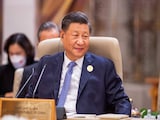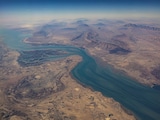President Donald Trump said he'll travel to Israel to be on hand for the release of hostages under the terms of a deal to end the war with Hamas, as Prime Minister Benjamin Netanyahu's security cabinet met late Thursday to sign off on the agreement.
The negotiating chief for Hamas also announced a deal to end the war, capping a stunning 24 hours that began with Trump announcing the agreement and the two sides confirming they were ready to proceed. It's a major breakthrough after months of failed attempts at stopping the two-year war, which has devastated Gaza, left tens of thousands dead and destabilized the Middle East.
"The hostages will be coming back Monday or Tuesday," Trump said in the Oval Office on Thursday. "I hope to be there." He also raised the possibility that he would address Israel's parliament, the Knesset.
Even as Israelis and Palestinians celebrated, there were concerns about whether the deal will stick. Earlier Thursday, Israel's deputy foreign minister, Sharren Haskel, said in an interview with Bloomberg TV a ceasefire was in effect. But Israeli forces also said military units struck a Hamas cell in the northern Gaza Strip that posed a threat to troops.
Hamas said at least four people were killed and called on mediators "and the U.S. administration to assume their responsibilities regarding these brutal crimes, to condemn them, and to intervene immediately to compel the occupation to stop targeting innocent children and unarmed civilians."
Other challenges remain. Two senior US officials, speaking to reporters on condition of anonymity on Thursday, said there were two phases to the deal - the hostage release and then what they called "almost a permanent ceasefire" where other issues would be worked out such as decommissioning weapons, standing up Gaza's new government and the redeployment of Israeli forces.
The officials acknowledged that there are a lot of ways the deal could go wrong but that Trump hoped to restore momentum for the expansion of the Abraham Accords, signed in his first term, that saw some countries normalize ties with Israel.
For the time being, though, the two sides said they were sticking to the terms of the agreement. Iran-backed Hamas is set to return all of the remaining 48 hostages held in Gaza - 20 of whom are believed to be alive. In return, Israel is due to release almost 2,000 jailed Palestinians and allow a ramp up of aid to Gaza through United Nations agencies and other international bodies. Hamas said it would open the Rafah crossing into Gaza to allow for the entry of aid.
If the ceasefire holds and Israeli officials agree, their forces will undergo a phased withdrawal from Gaza's city centers until they reach a buffer zone just within the Palestinian enclave's border.
Finance Minister Bezalel Smotrich, an ultra-nationalist member of Israel's ruling coalition, said he won't vote in favor of the deal, but stopped short of threatening to quit the government, signaling it's likely to pass.
Netanyahu hailed "a national and moral victory for the State of Israel." He said he had a "very emotional and warm conversation" with Trump in which they congratulated each other on the "historic achievement."
Hamas triggered the war with an attack on southern Israel on Oct. 7, 2023, killing 1,200 people and abducting another 250. More than 67,000 Gazans have been killed in the ensuing conflict, according to the Hamas-run health ministry. Some 450 Israeli troops have died in combat in Gaza. A panel supported by the UN said Israel was committing genocide, something Netanyahu's government denies.
The conflict has had ramifications far beyond Gaza, with Israel attacking Iran-backed militias in Lebanon, Syria, Yemen and Qatar. It also fought a 12-day aerial war against Iran in June, which saw the US strike the Islamic Republic's nuclear sites.
Under the ceasefire deal, Israel is due to allow a ramp-up of aid to the war-battered Palestinian enclave, where a humanitarian crisis led a United Nations-backed monitor to declare a famine in parts of the territory.
"We and our partners are prepared to move - now," UN Secretary-General Antonio Guterres told reporters. "We have the expertise, the distribution networks, and community relationships in place to act."
Crowds gathered in Hostage Square in Tel Aviv - a focal point for Israeli demonstrators calling for their release - to celebrate. There were also celebrations in Gaza, including in Khan Younis and Deir al-Balah, according to witnesses.
Photos from Egypt showed Israeli and Qatari negotiators embracing each other, something that would have previously been unthinkable given the tensions between the countries. Less than a month ago, Israel outraged Qatar by trying to assassinate a leading Hamas official with a missile strike on a residential compound in Doha.
The talks in Sharm El-Sheikh are likely to continue over outstanding issues, including the reconstruction and future governance of Gaza. Trump and Netanyahu have demanded that Hamas disarms and have no part in governing the territory. The group, designated a terrorist organization by the US, European Union and others, is yet to formally agree to that.
Still, a spokesperson signaled to Al Jazeera on Thursday that it is willing to do so.
"Hamas will not be part of the governance of Gaza, and we have shown all necessary flexibility in this regard," he told the Qatari broadcaster on Thursday. "We are discussing approaches with the mediators to reach a ceasefire, but not on the basis of surrendering weapons."
International leaders, including from Germany and the UK, welcomed the breakthrough. Many have denounced Israel's campaign in Gaza and in some cases moved to recognize a Palestinian state in response. French President Emmanuel Macron, who has repeatedly clashed with Netanyahu over the conflict, said the "agreement must mark the end of the war and the beginning of a political solution."
(Except for the headline, this story has not been edited by NDTV staff and is published from a syndicated feed.)















